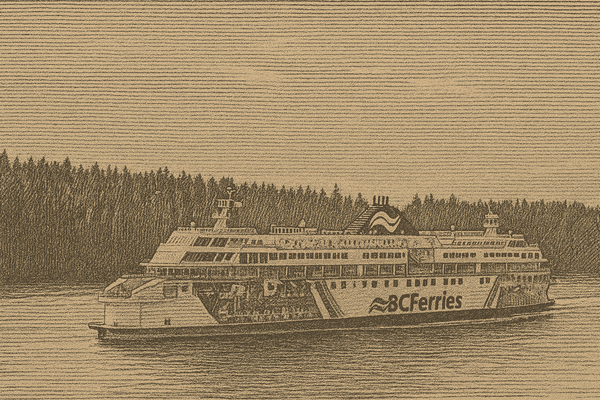Based on coverage from CBC, Global, and BIV.
In the world of shipbuilding, where waves of controversy often crash against the shores of public opinion, the latest storm involves B.C. Ferries and its decision to have four new vessels constructed by a Chinese state-owned shipyard. This decision has sparked a flurry of criticism from various corners, including Canada's largest and oldest shipyard, Davie, which claims the bidding process was skewed in favour of the Chinese.
Let's set the scene: B.C. Ferries, a vital lifeline for many coastal communities, announced its plan to build new ships in China, citing a $1.2 billion cost saving compared to European alternatives. However, this decision has not been smooth sailing. Critics, including Davie Shipyard, argue that the procurement process was rigged against Canadian companies from the start. Davie CEO James Davies penned a letter to federal MP Xavier Barsalou-Duval, highlighting that the criteria heavily favoured the lowest price, effectively sidelining Canadian shipyards.
The backlash isn't just about economics; it's also about politics and national pride. The decision comes amid rising tensions with China, which has imposed hefty tariffs on Canadian agricultural products like canola and seafood. Federal Transport Minister Chrystia Freeland expressed her dismay, pointing out the irony of awarding such a significant contract to a country currently embroiled in trade disputes with Canada.
But there's more to this story than just numbers and politics. The heart of the matter lies in the broader implications for Canada's shipbuilding industry. Davie and others argue that the focus on cost alone ignores the potential for innovation and domestic growth. They contend that the decision undermines efforts to bolster Canada's shipbuilding capabilities and sends a billion-dollar message that Canadian industry can't compete on the global stage.
B.C. Ferries, for its part, maintains that the decision was not solely about cost. According to Jeff Groot, the executive director of communications, technical considerations and environmental standards were also significant factors. Groot disputes Davie's claims, stating that Canadian content was indeed a scored consideration and that no formal proposal from Davie was ever received.
This isn't just a story about ships; it's about the future of Canadian industry and the role of government in supporting domestic capabilities. The controversy has sparked a broader debate about whether public funds should be used to support foreign economies, especially those with contentious trade practices. Conservative MPs and union leaders have called for the federal government to rescind the $1 billion loan from the Canada Infrastructure Bank, arguing that it effectively subsidizes jobs overseas.
As the waves of debate continue to rise, the question remains: What does this mean for the future of Canadian shipbuilding? The implications are significant. If Canadian companies are consistently outbid by foreign competitors, the long-term viability of the domestic industry could be at risk. This could lead to a reliance on foreign-built vessels, which may have broader economic and security implications.
Looking ahead, the spotlight is on B.C. Ferries and the provincial government to navigate these choppy waters. While Premier David Eby has resisted calls to cancel the contract, citing the need for quick and affordable solutions, the pressure is mounting. The transportation committee's ongoing scrutiny and public campaigns by labor groups could influence future decisions.
In the end, this isn't just a story about ships or contracts; it's a reflection of Canada's economic priorities and its place in the global market. As the debate continues, Canadians will be watching closely to see how this saga unfolds and what it means for the country's industrial future. Whether this storm will lead to a change in course or simply pass by remains to be seen, but one thing is clear: the conversation about Canada's shipbuilding industry is far from over.
Source 1 | Source 2 | Source 3








